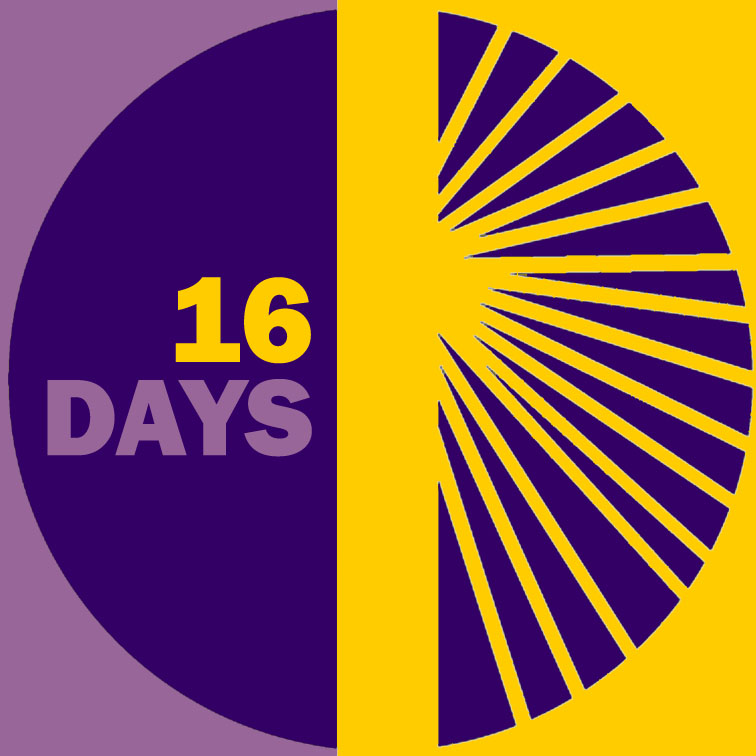'16 Days Campaign' - Together Against Gender-Based Violence:
According to a 2005 World Health Organization study, at least one in three women worldwide will be beaten, raped, or abused in her lifetime. The eradication of all forms of gender-based violence is integral to the struggle to achieve social justice and gender-equality. Violence against women permeates through every boundary, from the private to the public.
Since it was first launched in 1991, the 16 days of Activism Against Gender Violence international campaign has mobilized more than 4,100 organizations in 172 countries, raising awareness and educating the public worldwide about the pervasiveness of gender-based violence. This year’s campaign theme is From Peace in the Home to Peace in the World: Let’s Challenge Militarism and End Violence Against Women, highlighting the significant role that militarism plays in perpetuating violence against women and girls.
Today, 90% of casualties in war are civilians, the majority of whom are women and children. At times of conflict, lawlessness and social vulnerability, women are at an even higher risk of being subjected to sexual violence. In the common parlance of war, these crimes are made invisible – such forms of violence almost always go unnoticed, and rarely is there any redress. But we must state clearly that violence against women is a profound human rights violation.
Working against a backdrop of widespread instability and conflict in the Middle East, Africa and around the world, Women Living Under Muslim Laws links women from disparate Muslim communities around the world together in solidarity, and collectively empowers them in their local struggles against the scourge of gender violence and militarism.
Our Violence Is Not Our Culture campaign crucially raises awareness about culturally-justified violence (CVAW) against women in Muslim majority countries and within Muslim communities. Further, through our joint program, ‘Women’s Empowerment and Leadership Development for Democratization’ program, WLUML works to challenge CVAW and develop peace and security through feminist leadership, together with our partners from Indonesia, Pakistan, Senegal, Mali, Iraq, Syria, Iran, Tunisia, Libya, Sudan and Egypt.
In order to shine a spotlight on the work of activists worldwide during this period, WLUML will share their stories. Every day, for sixteen days, we will share short stories of and about our networkers, brave women and girls who against all odds, and despite threats and acts of violence, survive and carry on with the struggle for social justice and equality.
WLUML is transnational, and our partners have recently engaged in urgent activism in a wide range of contexts, including:
· Sudan: Journalist Somaya Hendousa was found dumped in the slums of Khartoum in October 2012, severely tortured, her head shaved, the victim of racial insults. She had been arrested by Sudanese National Security.
· Iran: Eight female political prisoners in Evin prison went on hunger strike this October after they were subjected to violent and invasive body cavity searches and sexual abuse by prison guards.
· Mali: Three executions, eight amputations and two floggings were carried out in recent months in Northern Mali, where Islamist groups have recently gained substantial control of territory. Reports suggest forced marriages are also on the rise.
· Tunisia: Earlier this year, a woman who accused two police officers of raping her was in turn threatened with prosecution for ‘indecency’ with her fiancé.
· Libya: Last March Eman al-Obeidi accused Qaddafi’s troops of gang raping her. Her attackers then attempted to sue her for defamation.
· Egypt: Several political protestors last spring were detained at a military prison and subjected to forced ‘virginity tests’ and electrocution. This March a military court found the doctor accused of the former innocent of all charges.
We strongly condemn these and all other attacks on women’s rights to dignity, bodily integrity and privacy. We decry the continuing impunity of militant groups and agents of the State, and we call attention to the ways in which violators attempt to silence victims of gender-based violence through shame, social sanction and charges of indecency.
States have clear and concrete obligations under international human rights law to prevent gender violence, punish perpetrators, and provide access to justice, relief and reparations for victims and survivors of violence. We stand together and call upon all States to:
1. Respect, protect, promote and fulfil all human rights and take urgent and direct measures to secure gender equality
2. Take into account that a culture of militarism propagates and reinforces a culture of violence, and to take all necessary measures to facilitate disarmament and promote peace;
3. Pursue without delay a policy of eliminating violence against women, strengthening the rule of law, and the capacities of justice systems to address gender violence;
4. Prevent gender-based violence at its roots through urgent action on cultural paradigms that allow gender-based violence to continue, and ensure that women’s rights to dignity, privacy and integrity are upheld at all levels of society.



